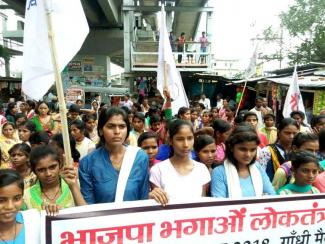
Around March-April 2018, KOSHISH, a field action project on homelessness and destitution, based in Tata Institute of Social Sciences, Mumbai, submitted a social audit report of institutions and shelter homes for children, women and destitute persons run by civil society organisations in Bihar. The report was submitted to the Principal Secretary, Department of Social Welfare, Bihar and it was aimed at documenting the experiences of those residing in these institutions and homes. These institutions that include children homes, observation homes, short stay homes, open shelters and old age homes provide shelter to a large number of people from extremely vulnerable socioeconomic groups such as destitute children, juvenile offenders, women in distress, elderly citizens, people in beggary etc. The purpose of the audit was to focus on the experiences of the residents and uncover the ground realities in these institutions, since only statistical figures often cited in most reports tend to hide the actual experiences. Beginning their field visits in September 2017, the Koshish team visited 110 shelter homes in 35 districts in Bihar for the next 7 months.
As the team interacted with the residents of these homes, what emerged were “grave concerns” that the team felt that they could not “ignore or deny anymore”. Unfortunately for months after the report was submitted, the state government of Bihar continued to ignore and deny what were not just matters of concern, but criminal acts of gross physical and sexual abuse of the residents of these homes. The story of the Muzaffarpur shelter homes that finally did make it to the news headlines and shook the nation is alas, only one such story that has found voice. The TISS report and more recently the news coming from shelter homes in Deoria in Uttar Pradesh are grim reminders of several such horrific stories that remain forcibly hidden.
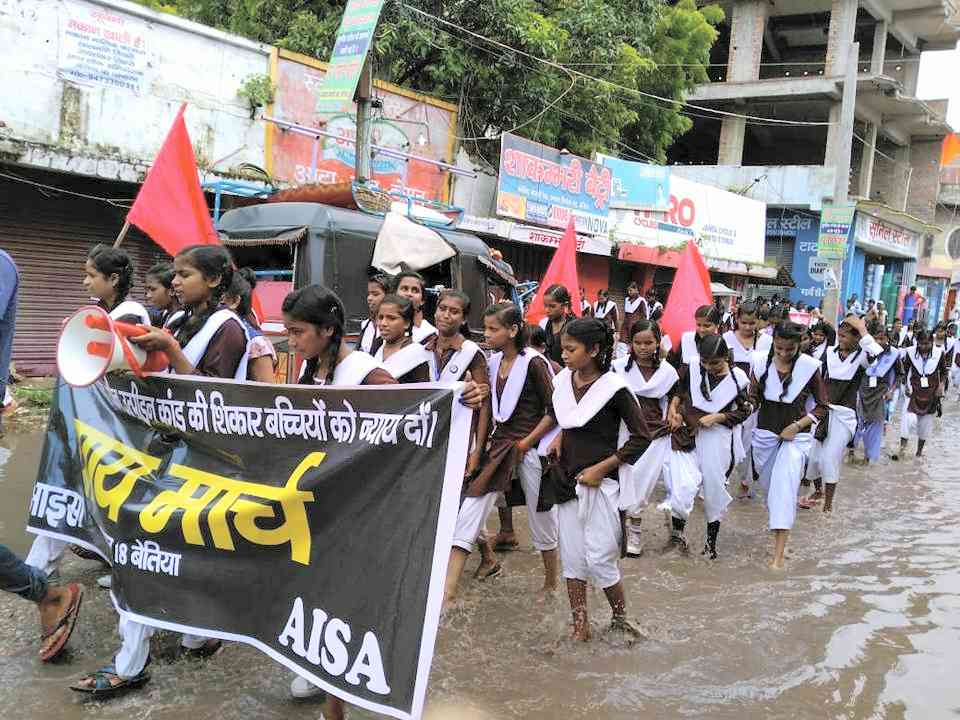
Findings of the TISS Report
The social audit report of the shelter homes brought out several infrastructural inadequacies and the failure of several of these homes to fulfil the purpose of rehabilitation and capacity building of the residents. However, among the failures that stood out the most was in context of these homes providing ‘protection’ to the most vulnerable sections in the society. It may be noted that several of these institutions were started as a part of the Integrated Child Protection Scheme launched by the Centre in 2009. The short stay homes for women were conceptualised with the vision of addressing the issues and challenges of women facing Gender-based Violence and were aimed at providing a safe environment to survivors of abuse and those apprehending abuse. Linked with the women helpline, these homes were established under the charge of the Women Development Corporation (WDC) that operates from within the Department of Social Welfare, Government of Bihar. WDC is a nodal agency for implementing women development initiatives for the State and it works in partnership with Community Based Organisations, Administration & NGOs.
The social audit report revealed how the primary purpose of ‘protecting’ vulnerable children and women was made a complete mockery off as these homes themselves became the spaces of massive physical and sexual abuse. The statistical figures on abuse are shocking. In the Children’s Homes established with a mandate towards building the capabilities and skills of children with the view of facilitating their reintegration and mainstreaming into the society, 45% of boys and 50% of girls interviewed, reported physical abuse. The reporting of sexual abuse from boys’ children homes was 9% and from girls’ children home, it was 12%. In the Open Shelters provided for under Section 43 of the Juvenile Justice Act for protecting children from abuse and keeping them away from a life on the streets, 50 % of the resident children reported experiencing violence in the shelters. In Observation Homes established for juvenile offenders between the ages of 7 and 18 which aim to provide these children with food, protective shelter, education and recreational facilities, and vocational training to fasten rehabilitation upon release, the experience of violence was reported by 91% of the children interviewed. In the short stay homes, women who had come there expecting a safe environment, reported moral policing, shaming, humiliation and abuse. The narratives of women revealed shocking narratives of forced confinements, victim blaming and complete denial of choice and consent. According to the report, “girls reported being picked up in large groups from coffee shops, restaurants etc. while they were out with their male friends and sent to these homes in the name of protection… Casual sexism was found to be rampant… Rape victims and victims of violence reported being ridiculed by the staff and told that they were only reaping the harvest of their ill-deeds”. However, the ordeal of the young girls and women did not end here.
The TISS team found it extremely crucial to include a separate section on grave concerns since the statistics quoted above could not adequately capture the violence unleashed by these spaces that were established to protect. The report says, “While abuse, varying in forms and degrees of intensity, was reported to be prevalent in almost all institutions, there were certain institutions that stood out in a manner that was appalling. Almost all institutions were found to be running in violation of the respective schemes… but the residents’ inalienable right to life was in question in certain institutions.” It is here that the Girls’ children home in Muzaffarpur run by ‘Seva Sankalp Evam Vikas Samiti’ found the top mention. According to the report, the Muzaffarpur shelter home in question was found “to be running in a highly questionable manner along with grave instances of violence that was reported by the residents. The institution was exclusive in carrying out sexual violence on the girls, all of a tender age and from marginalised backgrounds…”
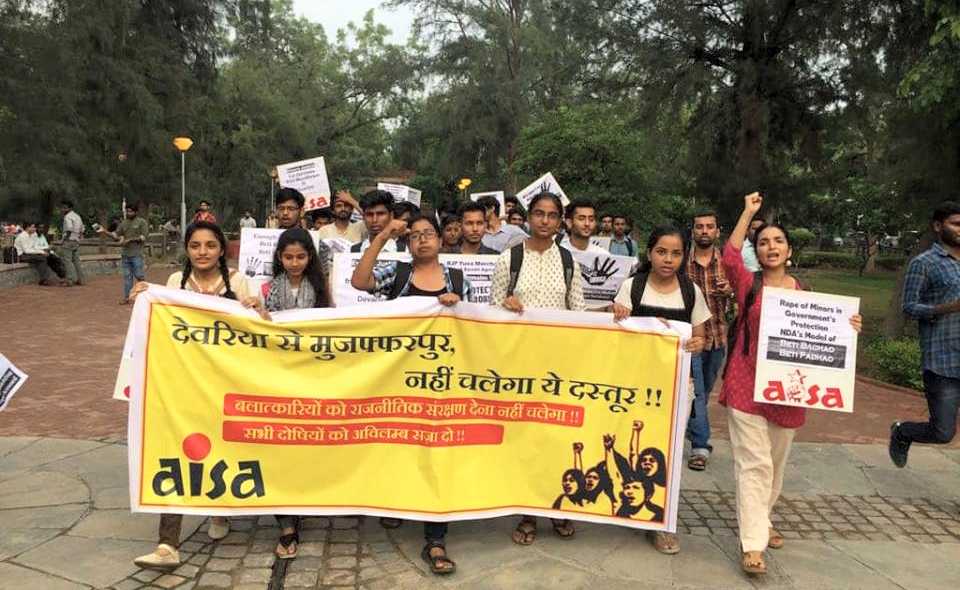
Bihar Government’s Criminal Silence on the Report
What the TISS report shared in its findings were not mere inadequacies and shortcomings in running these institutes. In the particular case of the girls’s home in Muzaffarpur, the social audit reported serious crimes against minor girls. However, it was not till 31 May 2018, more than a month after submission of the report that the Department of Social Welfare filed an FIR and it was only on June 2 that Brajesh Thakur, the politically well-connected owner of the NGO that ran the particular shelter home, was arrested. The abuse that girls in the shelter faced was not just at the hands of the staff in the home. What emerged in the following days was a horrific narrative of the girls supposedly being ‘protected’ and ‘cared for’ by the NGO, being supplied to men in hotels and or being sexually exploited by men who would visit the home. Girls who protested were burnt with cigarette butts, beaten with rods and tortured. At least one girl was reportedly killed and buried on the premises.
Shockingly, in all this time from submission of the report to the filling of the FIR and the details of the happenings in the shelter home finally gaining space in media reports, an unmoving and determined silence was maintained on the issue by the Bihar CM and his government. Women came out on streets, angry protests were held and amidst of all it, the conscience of the Bihar CM Nitish Kumar remained undisturbed and asleep. No inquiry was called for, no statement was made that could assure hundreds of boys and girls still residing in several other shelter homes whose running had also come into questioning, of the government’s concern about them. And this silence is not difficult to interpret. Brajesh Thakur, the owner of the NGO running the shelter home was found to enjoy a close association with several BJP and JD (U) leaders. Brajesh Thakur, who runs a local newspaper Pratah Kamal, that despite its unenviable circulation has been found to be beneficiary of of government advertisements worth crores of rupees. He also contested the Assembly election in 1995 and 2000 from Kudhani in Muzaffarpur as a candidate of the Bihar People’s Party, then an ally of the BJP. It is no surprise then that the ruling JD (U) and BJP leaders not only remained silent but also actively tried to shield him. What could be a more direct indictment of the complicity of the government than the fact that the husband of the state’s Social Welfare Minister Manju Verma was a regular visitor to the Muzaffarpur shelter homes and was known to have close links with Brajesh Thakur. Imagine the sheer horror of the fact that the minister responsible for ensuring that these shelter homes remain safe spaces and to whom one would hope to report an abuse expecting action, was complicit with the one responsible for the reign of terror in these homes. In case of Manju Verma also, the government refused to respond to the accusations against her and her husband’s link with Brajesh Thakur or sack her. It was only after massive protests broke out across the state that a delayed and inadequate face saving was attempted by securing her resignation!
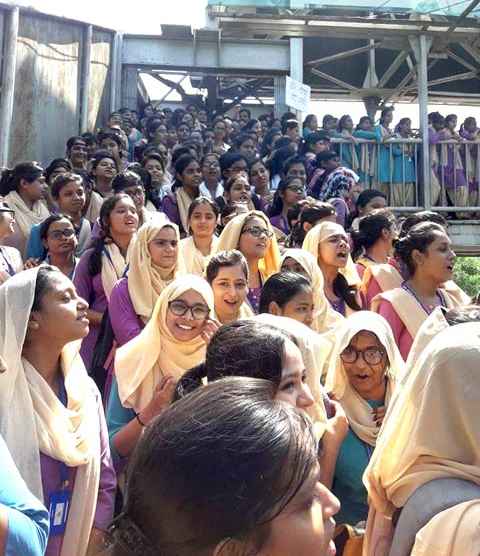
The whole of June and July, women of Bihar were on streets demanding inquiry, demanding sacking of complicit officials and demanding that the CM of the state speak up. Nitish Kumar was finally was forced to break his silence on August 3, a day after the Supreme Court took suo motu cognisance of the allegations. Girls’ hostels and shelter homes have became spaces of terror in Bihar and the government remains unmoved. It was only last year that a young Dalit girl Dika was brutally raped and murdered in a government run residential school in Vaishali. Dika had shared with her mother of the exploitation and abuse that happened in the residential school. When her mother went to the school to raise this with the authorities and bring her daughter back, she was denied, only to find her daughter raped and murdered a day later. Women particularly from marginalised sections are clearly unsafe and highly vulnerable in Bihar, a state run by a self-proclaimed messiah of social justice without a conscience and a party that in the garb of ‘Beti Padhao- Beti Bachaao’ (Save and Educate Daughters) has only been seen defending rapists to the extent of taking out rallies in support of rapists and withdrawing cases of sexual abuse against men of power! The PM who is otherwise quick to share his ‘Mann ki Baat’ and take to social media frequently, has also maintained silence on the issue.
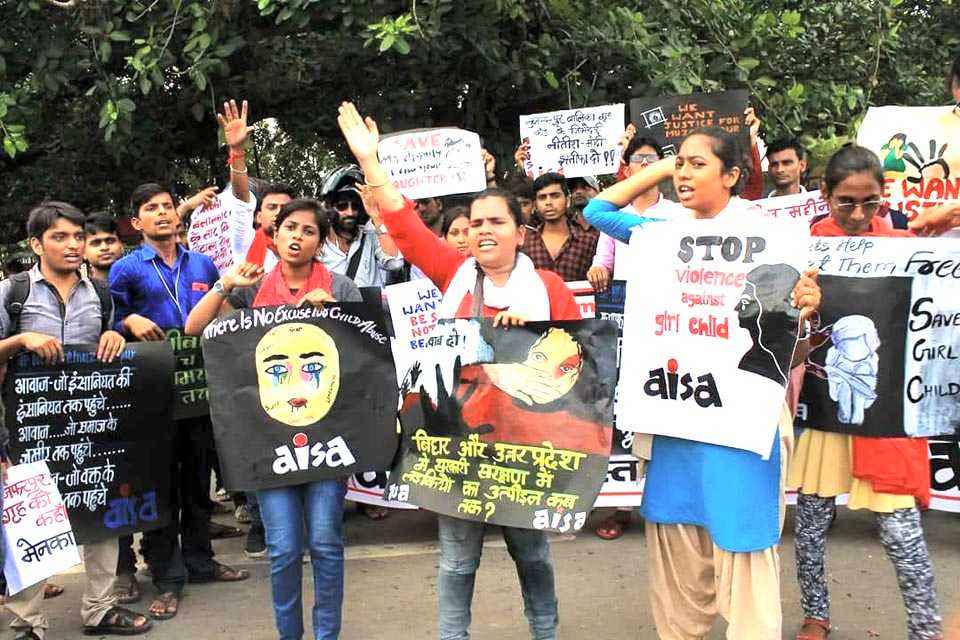
Ladegi Beti: Girls Fighting Back
The silver lining in the dark clouds hovering over Bihar has been the tremendous resistance and courage shown by young girls and women who have refused to leave the streets, continuing to protest and forcing the CM to break his silence, to ensure that Manju Verma resigns and colluding officials are sacked and that CBI inquiry takes place. Each of these small but significant victories have not come easy. AIPWA has played a stellar role in mobilising the women and ensuring that incident is not swept away into oblivion by a disinterested media and an otherwise hyperactive government keen to have this issue pushed away under the carpet.
As soon as the report of rampant sexual abuse in Muzaffarpur shelter homes came out, an AIPWA team visited the spot and released a report to the media, which at that time most channels did not take notice of. On 22 June thousands of women under the banner of AIPWA gheraoed the Bihar Secretariat on this issue and thereafter began a series of meetings with school girls, girls residing in state run hostels and young girls and women in different localities are being organised with an aim to mobilise them on the issue and also to bring to fore the concerns around women’s safety and freedom. On 13 July women’s groups held a Press Conference and issued an open letter to the CM Nitish Kumar. Seeing that the government was in no mood to pay heed and respond, Women’s organisations including AIPWA held a procession wearing black clothes and waving black flags in Patna on 20 July, observing Black Day against the sexual exploitation of girls in Government-run shelter homes in Bihar, especially the Shelter Home in Muzaffarpur. The protesters presented symbolic black scarves to representatives of the Government. CPI (ML) MLAs also protested on the first day of the Assembly session, and introduced an adjournment motion in the Assembly which was supported by some Opposition parties. Under pressure from these protests the Government eventually had to order a CBI enquiry. A joint protest took place at Bihar Bhavan in Delhi also, as well as in Varanasi, Jaipur, and many other places.
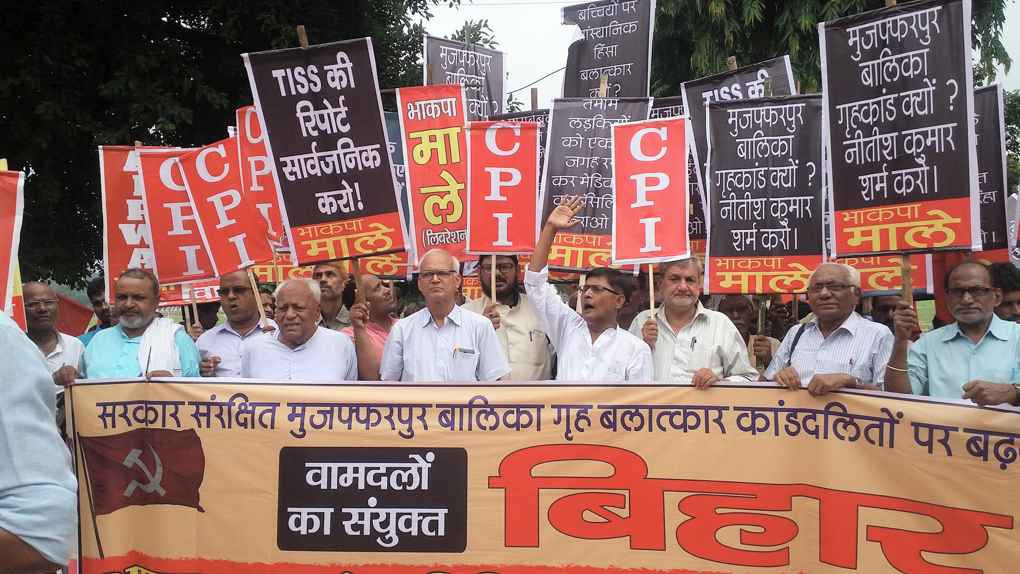
A Bihar Bandh was jointly declared by Left parties on 2 August, demanding sacking of Bihar Social Welfare Minister Manju Varma and BJP Minister Suresh Sharma, the arrest of her husband, release of the TISS report to the public, a CBI enquiry of the conditions not only in the Muzaffarpur Home but in all Government-run shelter homes and remand homes in Bihar. Onwards to the bandh, on 30 July women’s groups again held a procession which culminated in a public meeting at from Dak Bangla crossing which was addressed by AIPWA GS Meena Tiwari, State Secretary Shashi Yadav, State President Saroj Chaubey and several women activists from Bihar Mahila Samaj, AIDWA, Bihar Women’s Network, Sajha Manch, Bihar Muslim Mahila Manch, Beti Zindabad, Lok Parishad and many others. The activists speaking at the meeting asked – if girls in a Government-run shelter home are subjected to such systematic sexual exploitation, rape and murder, how can this Government be trusted to help women and children who face abuse and rape in their own homes and in public places?
In midst of the massive mobilisations and protests on the streets, AIPWA leaders across the state have continued to organise meetings in school and localities, encouraging women and girls to speak up and join the movement. Several marches and rallies led by school girls, common women in localities of Gopalganj, Bettiah, Muzaffarpur, Patna and many other cities and villages. The women in all these localities by joining in these marches in large numbers have shown their resilience and refusal to cower down.
Most inspiring of all is the leading role of schoolgirls in these protests: instead of being passive recipients of ‘protection’ they are speaking up, raising slogans, demanding respect and autonomy and an end to the hierarchical, humiliating and draconian conditions in schools and ‘shelters’ which is the breeding ground for the violence and exploitation.
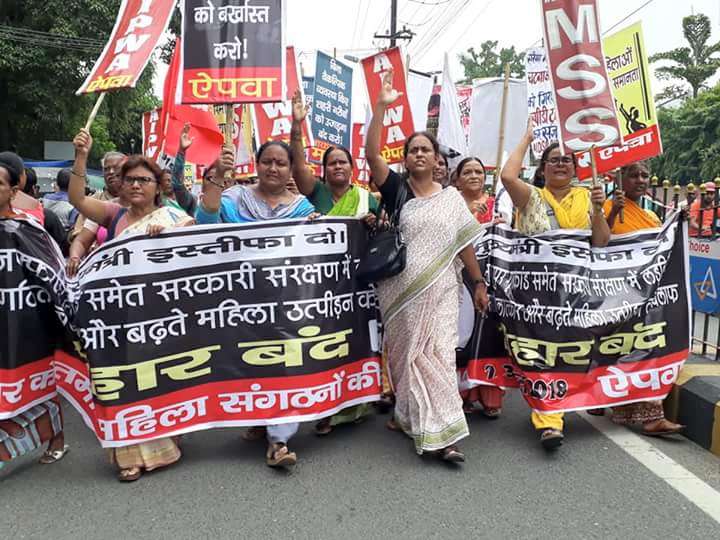
As the movement to bring all the culprits responsible for the Muzaffarpur Shelter Home Rapes gains strength, we must not forget that Muzaffarpur shelter home is only one the several other such homes that were reported for rampant abuse in their premises. Recently, a joint CPI (ML)-AIPWA-AISA-RYA enquiry team team visited the Aasra Shelter Home in Patna on 19 August 2018 where deaths of two women were reported. The team has shared that on the basis of talks they had with the girls in the shelter home and with neighbouring people, it seems that the deaths of Babli (40 years) and Poonam (17 years) were not normal or natural deaths, but both were killed under a conspiracy. The role of the local Thana is also suspect in this matter. The enquiry team said that conditions at the Aasra Shelter Home are extremely horrifying. The girls residing there are living in fear.
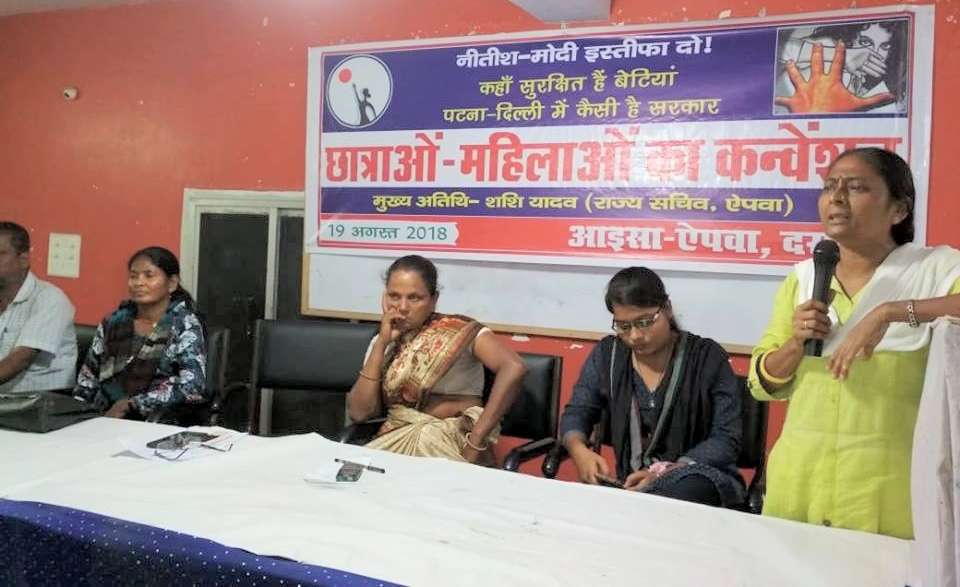
On 19 August AIPWA and AISA jointly organized a convention in a college in Darbhanga against the increasing violence against women that is taking place almost under state patronage in the various shelter homes and hostels run by the government and NGOs. Sharing the details of the TISS report with the audience, along with reports of abuse coming from various other shelter homes, the convention demanded the resignation of the Bihar CM and deputy CM. Com. Shashi Yadav in her speech said that women were not safe in the Nitish-Modi rule. She demanded that the TISS report be made public and announced that a massive human chain will be organised across on Bihar on 28 August in support of the demands. The AIPWA leaders asserted that the women’s movement against these state supported violence on women will only intensify in days to come.
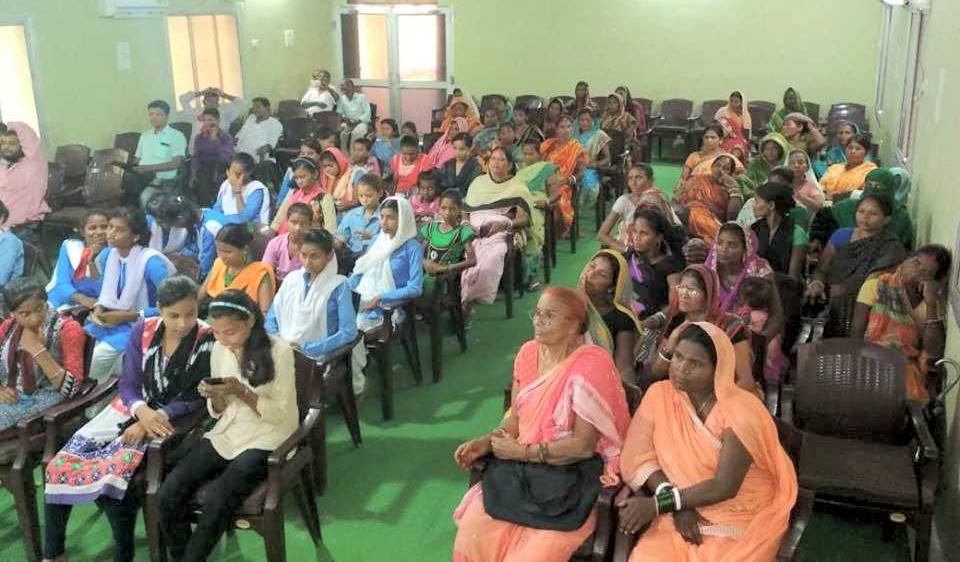
-- Shivani Nag
Liberation Archive
- 2001-2010
-
2011-2020
- 2011
- 2012
- 2013
- 2014
- 2015
- 2016
- 2017
-
2018
- January-2018
- February-2018
- March-2018
- May 2018
- June-2018
- July 2018
- August 2018
-
September 2018
- Resolve of Independence Day 2018: End the Disastrous Modi Regime to Stop the Lynch Mobs and Loot Brigades
- Atal Bihari Vajpayee And The Evolution Of The Indian Right
- Defeat the BJP's Divisive Agenda over NRC
- ABP Resignations: The Truth Of A Modi-Managed And Modi-Muzzled Media
- Sanghi Terror Out In The Open
- Banking Sector And Modi Govt
- Comrade DP Bakshi (17 May 1948 – 26 July 2018)
- Muzaffarpur Shelter Home Rapes: Dark Underbelly of 'Beti Bachao'
- Farmers Court Arrest on August 9 During Countrywide Jail Bharo
- Tea Workers' Strike in West Bengal
- Report of Fact Finding Team on Undeclared Emergency-Like Situation in Tripura
- Kuldip Nayyar: Tireless Defender of Democracy
- Adieu, Prof. Samir Amin
- International Solidarity: Attempt to Attack Bolivarian Revolution Fails
- Stop the repression of students in Bangladesh!
- Disturbing Reports of Persecution of Muslims in China
- Comrade Somnath Chatterjee
- Stand With Kerala!
- October 2018
- November 2018
- December 2018
- 2019
- 2020
- 2021-2030
Charu Bhawan, U-90, Shakarpur, Delhi 110092
Phone: +91-11-42785864 | Fax:+91-11-42785864 | +91 9717274961
E-mail: info@cpiml.org







